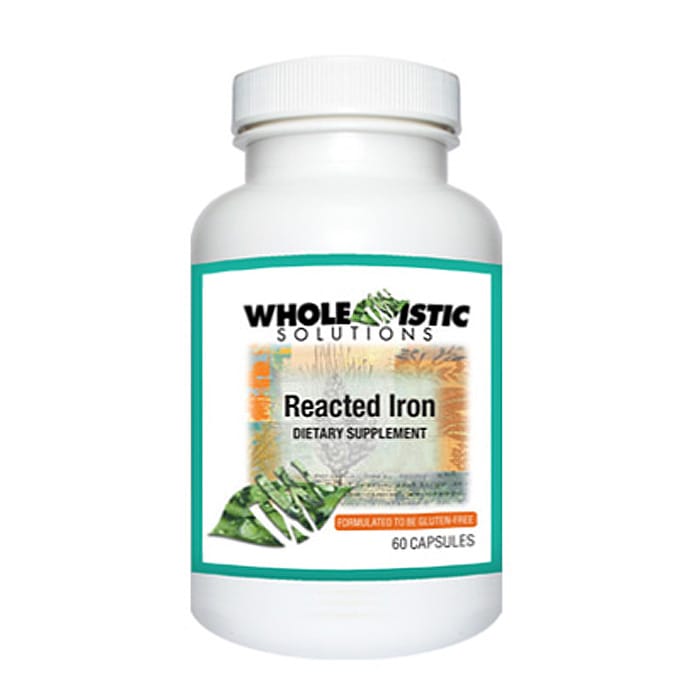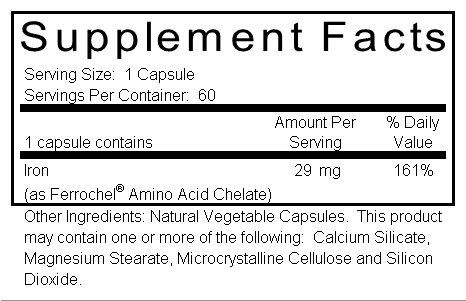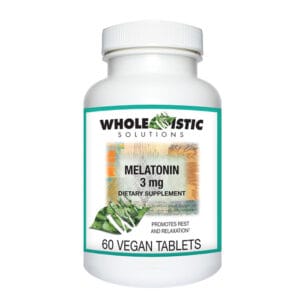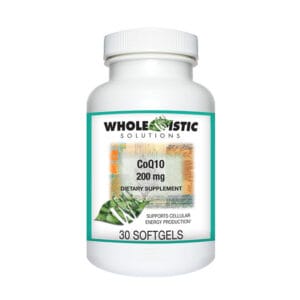Reacted Iron provides 29 mg of elemental iron per serving, ideally formulated using the amino acid chelate form of iron (ferrous bisglycinate) for enhanced absorption, optimal utilization and gastrointestinal (GI) comfort. Some individuals who take other forms of iron supplements may experience GI side effects, including gas, bloating, constipation or a combination of these symptoms. Supplementing the right form of iron can be key to maintaining healthy levels within the body and compliance to a supplement regimen.
Overview
Iron is one of the most abundant minerals on earth. It is essential to the majority of life forms, especially human physiology. Iron supports prenatal and cognitive health, as well as energy balance. Iron is an integral component of the proteins involved in oxygen transport and storage: hemoglobin, myoglobin and ferritin. Iron, as part of the protein hemoglobin, carries oxygen from the lungs to various parts of the body. Hemoglobin accounts for nearly two-thirds of the iron found in the body, and carries essential oxygen to tissues and organs. Approximately one-sixth of the body’s iron is stored as ferritin for use when dietary intake is not sufficient. Iron must be maintained at balanced levels within the body – too much can cause toxicity and too little may lead to impairment of optimal health outcomes. Iron has to be carefully absorbed by the body. Interference can easily occur, making adequate consumption through diet and supplementation imperative to achieving a healthy balance. [1-8]
Bioavailability
The importance of bioavailability is obvious. If consuming an iron supplement has little effect on improving the body’s iron balance, there is no reason to ingest it. Signs of inferior mineral supplements include the use of cheap, poorly absorbed, rock-salt minerals. Reacted Iron is formulated with the superior amino acid chelate form, ferrous bisglycinate, which does not ionize in the gut. Like heme iron (the most bioavailable form of iron found in some protein food sources), Ferrochel® Ferrous Bisglycinate is not impacted by dietary factors and is absorbed at a 59 % higher rate than lesser forms, such as ferrous sulfate (See Figure 1).
Comparison studies have shown significantly superior absorption of the iron chelate form compared to other rock-salt forms (most commonly ferrous sulfate).
- Iron from Ferrochel® iron shows absorption rates 59 % higher than ferrous sulfate
- Ferrochel® iron is absorbed at a rate 3.8 times higher than ferrous sulfate
- Ferrochel® iron shows a reduced number of adverse complaints compared to ferrous sulfate
- No complaints of side effects were reported by subjects at 30 mg per serving
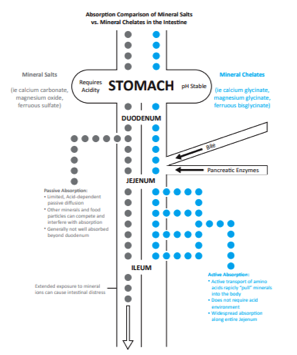
Energy Balance
Iron supplements are often a standard recommendation for the treatment of fatigue, particularly among women. A 2012 randomized study confirmed the efficacy of iron in supporting energy balance. French researchers studied nearly 200 menstruating women ages 18 to 53 who complained of fatigue but were otherwise healthy. All subjects had lower-than-normal ferritin levels (less than 50 mcg per liter). During the study, half of the subjects took 80 mg of iron daily, while the other half took a placebo. Fatigue was measured using a validated questionnaire at the beginning and end of the study. At the close of 12 weeks, patients receiving the iron pills reported favorable outcomes related to fatigue and energy balance compared to the placebo group. The researchers also found that iron supplements increased the production of red blood cells. [13]
Prenatal Support
Several major health organizations recommend iron supplementation during pregnancy to ensure pregnant women meet their iron requirements for healthy pregnancy outcomes. For all pregnant women, the Centers for Disease Control and Prevention recommends routine low-dose iron supplementation beginning with the first prenatal visit.[14] Larger doses of iron may be recommended following thorough testing to determine low hemoglobin or hematocrit.
Cognitive Health
In a 2013 study, published in the Canadian Medical Association Journal, daily iron supplementation was shown to support outcomes associated with cognitive health, including attention and concentration. Additionally, the same study found that healthy outcomes were supported related to incidences of general iron deficiency.
Directions
1 capsule per day or as recommended by your health care professional.
Does Not Contain
Gluten, yeast, artificial colors and flavors.
Cautions
If you are pregnant or nursing, consult your physician before taking this product. Accidental overdose of iron-containing products is a leading cause of fatal poisoning in children under 6. Keep this product out of reach of children. In case of accidental overdose, call a doctor or poison control center immediately.
References
1. Institute of Medicine. Food and Nutrition Board. Dietary Reference Intakes for Vitamin A, Vitamin K, Arsenic, Boron, Chromium, Copper, Iodine, Iron, Manganese, Molybdenum, Nickel, Silicon, Vanadium and Zinc. Washington, DC: National Academy Press, 2001.
2. Bothwell TH, Charlton RW, Cook JD, Finch CA. Iron Metabolism in Man. St. Louis: Oxford: Blackwell Scientific, 1979.
3. Miret S, Simpson RJ, McKie AT. Physiology and molecular biology of dietary iron absorption. Annu Rev Nutr 2003;23:283-301.
4. Uzel C and Conrad ME. Absorption of heme iron. Semin Hematol 1998;35:27-34. [PubMed abstract].
5. Sandberg A. Bioavailability of minerals in legumes. British J of Nutrition. 2002;88:S281-5. [PubMed abstract]
6. Davidsson L. Approaches to improve iron bioavailability from complementary foods. J Nutr 2003;133:1560S-2S. [PubMed abstract].
7. Hallberg L, Hulten L, Gramatkovski E. Iron absorption from the whole diet in men: how effective is the regulation of iron absorption? Am J Clin Nutr 1997;66:347-56. [PubMed abstract].
8. Monson ER. Iron and absorption: dietary factors which impact iron bioavailability. J Am Dietet Assoc. 1988;88:786- 90.
9. http://www.albionferrochel.com/
10. Haas JD, Brownlie T 4th. Iron deficiency and reduced work capacity: a critical review of the research to determine a causal relationship. J Nutr 2001;131:691S-6S. [PubMed abstract].
11. Bhaskaram P. Immunobiology of mild micronutrient deficiencies. Br J Nutr 2001;85:S75-80. [PubMed abstract].
12. Allen LH, Iron supplements: scientific issues concerning efficacy and implications for research and programs. J Nutr 2002;132:813S-9S. [PubMed abstract].
13. Vaucher P, Druais P, Waldvogel S, Favrat B. Effect of iron supplementation on fatigue in nonanemic menstruating women with low ferritin: a randomized controlled trial. CMAJ. 2012 Aug 7;184(11):1247-54.
14. CDC Recommendations to prevent and control iron deficiency in the United States. Centers for Disease Control and Prevention. MMWR Recomm Rep 1998;47:1-29.

